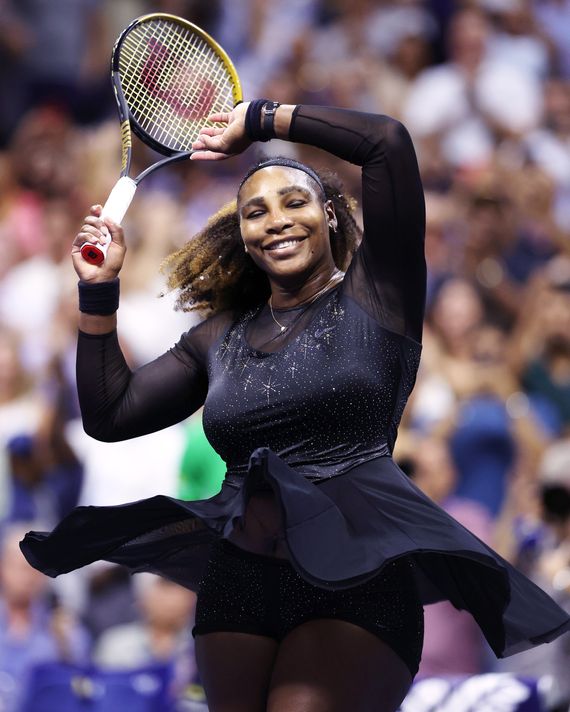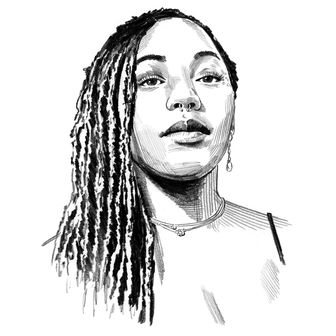
It seems like an obvious end to the best story ever: Serena Williams, one of the most legendary tennis stars in a millennia who changed the brand and business of the game is leaving to put those skills to use in her own business, where the instincts and impulses she’s learned will help her do a completely different kind of job, one where she’s the dealbreaker instead of the product. There’s an edge to that transition; it does not fit perfectly with what we’ve come to see from most superstars.
Most superstars hang on to relevancy and stardom for dear life, remaking themselves in the mold of the Zeitgeist every few decades to stay marketable. We don’t expect anyone to willingly give that up if they don’t have to. Serena does not have to give up superstardom to take this next step in her life — she’ll always be the Greatest Athlete of All Time — but choosing to give this career over, and to move over, is a step taken with little precedent, and with much sadness too. “It’s the hardest thing that I could ever imagine,” she told Vogue last month. “I don’t want it to be over, but at the same time I’m ready for what’s next.”
Few athletes, especially Black women, retire by choice. They retire because the sport has no more room for them, because their bodies are too broken down to beat the younger athletes they’re competing against. Serena is still winning (see: her stunning defeat against Anett Kontaveit in the second round of the U.S. Open on Wednesday), still considered the GOAT, even by the younger players who have sometimes, albeit rarely, bested her in a match. Serena isn’t retiring because she has to, she’s retiring because the rest of her life is calling: a new career; a young marriage; an adorable daughter who really wants a little sister.
Serena Williams is once again a pioneer in doing what most of us can barely begin to imagine — this time, she is putting down the reins of one life in order to grab the reins of a new one.
Especially in Black communities, retirement is a joyous occasion — and a heavy ritual. After more than 50 years of labor, we rent out halls and cook big meals and buy white to celebrate our elders as they enter the final stage of their professional journey, the stage that ushers them into a scary new conversation about the beginning of the end. My grandmother retired in her 70s — she would have worked longer if she weren’t ill — and when I asked her what she would do next she said, “Going and sit down.” It was funny in her singsongy Caribbean accent, but I remember that it made me sad. She sat in the little apartment where I spent my childhood weekends until she couldn’t get down the stairs anymore and had to have groceries delivered. Retirement was the chance for our grandmothers to finally rest, and to take stock of their lives. But it feels unfair that when she finally got the chance to sit down, she was too tired to do anything else.
Social Security benefits are projected to begin running out in 2034. The Earth and our ecosystems are in crisis — life as we know it is quickly changing because of global warming. Retirement means something different to me than it did to my grandparents. Serena’s retirement, which she prefers to call “evolution,” is the only model of retirement I’m interested in anyway. I watch Serena leave the girl she used to be behind and it makes me want to retire as often as I can. I want to retire as many times as possible, I want to retire once every decade, no matter how painful. I want to get tired of the girl I used to be and leave her behind for a better version; for a version that lives in a different country, that writes different kinds of stories, that does different kinds of jobs. I want to retire to become a painter, and then I want to get so good and so tired of being a painter that I become an awful filmmaker. I want a new career at 30, and a new career at 60, and then again at 80. One person can live many lives — Serena’s transition is a reminder that perhaps we all should.
I know that my mother — a lawyer who wanted to be an architect — always felt like she had too many responsibilities and too little self-confidence to make a career change. As she’s approaching her 50s, I wish I could give her the self-awareness and self-love that it takes to make the kind of decision that Serena has made — one rooted in adventure instead of necessity. She thinks that time has left her behind, or that she doesn’t get to be one of those people who takes selfish risks, a perspective that many Black women share because our lives have been shaped around labor and responsibility, rarely around our actual humanity and needs. I try to tell my mother that this is a myth: that it doesn’t matter that we are not wealthy or famous or well-connected. I try to tell her that no one needs to be a superstar to change their mind.
I won’t miss Serena. I’ll watch her old matches on YouTube and see every documentary about her made by man. I’ll continue to compare every newcomer to her, no matter how unfair (sorry!) and wish that someone could bring her power, her grace, her tenacity and strategy to the court. Sometimes I’ll be satisfied, most times I’ll be underwhelmed. I’ll stan some other young Black tennis player (I’m already a big fan of Naomi Osaka and Sloane Stephens) and heart all the photos Serena posts with yachts in them. I won’t miss her, because she didn’t ask to be missed. She’s retired without anyone’s permission and has made the choice to do something different with her life. She doesn’t owe it to us to be the Serena we’ve always known, nor does she owe it to us to spend the rest of her life performing for our inspiration or entertainment.
In this next life, Serena Williams gets to be whomever else she wants to be, and that’s enough inspiration to last me 1,000 wins. Because in a world where the definition of freedom depends on who you are, choosing a new life simply because the old one — the old career, the old relationship, that old way of being — can no longer give you what you need, is the closest to true freedom many of us will ever get.


